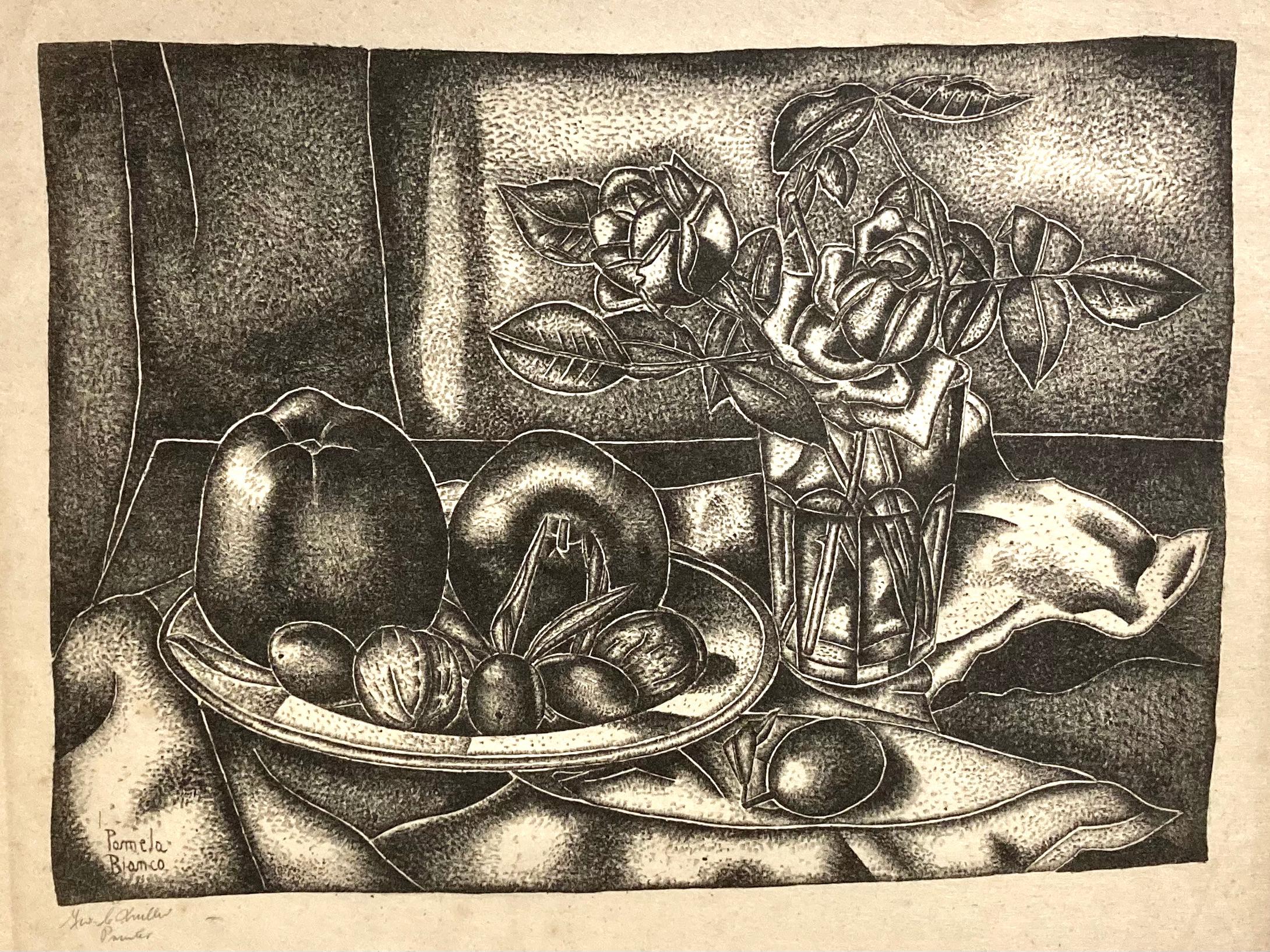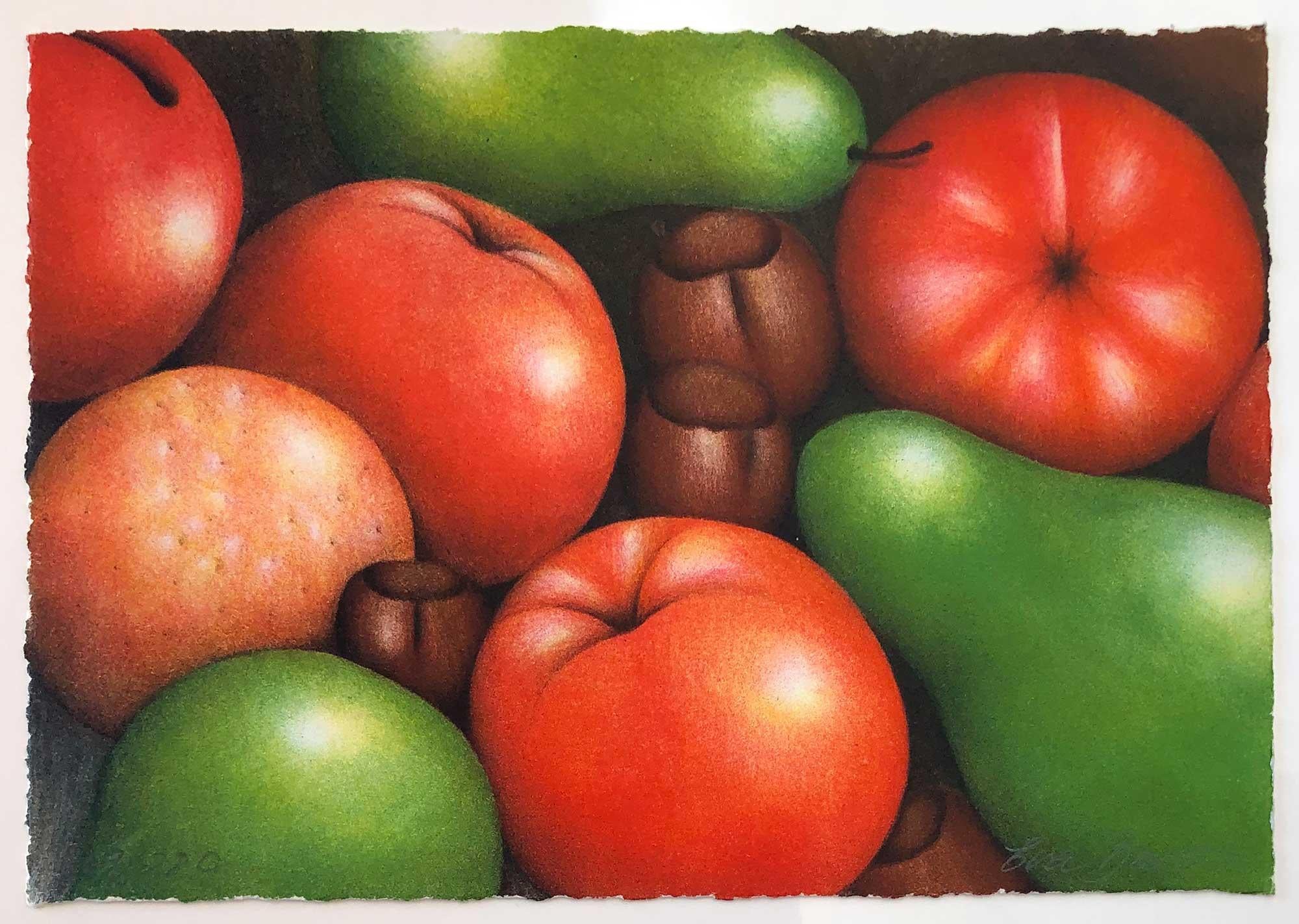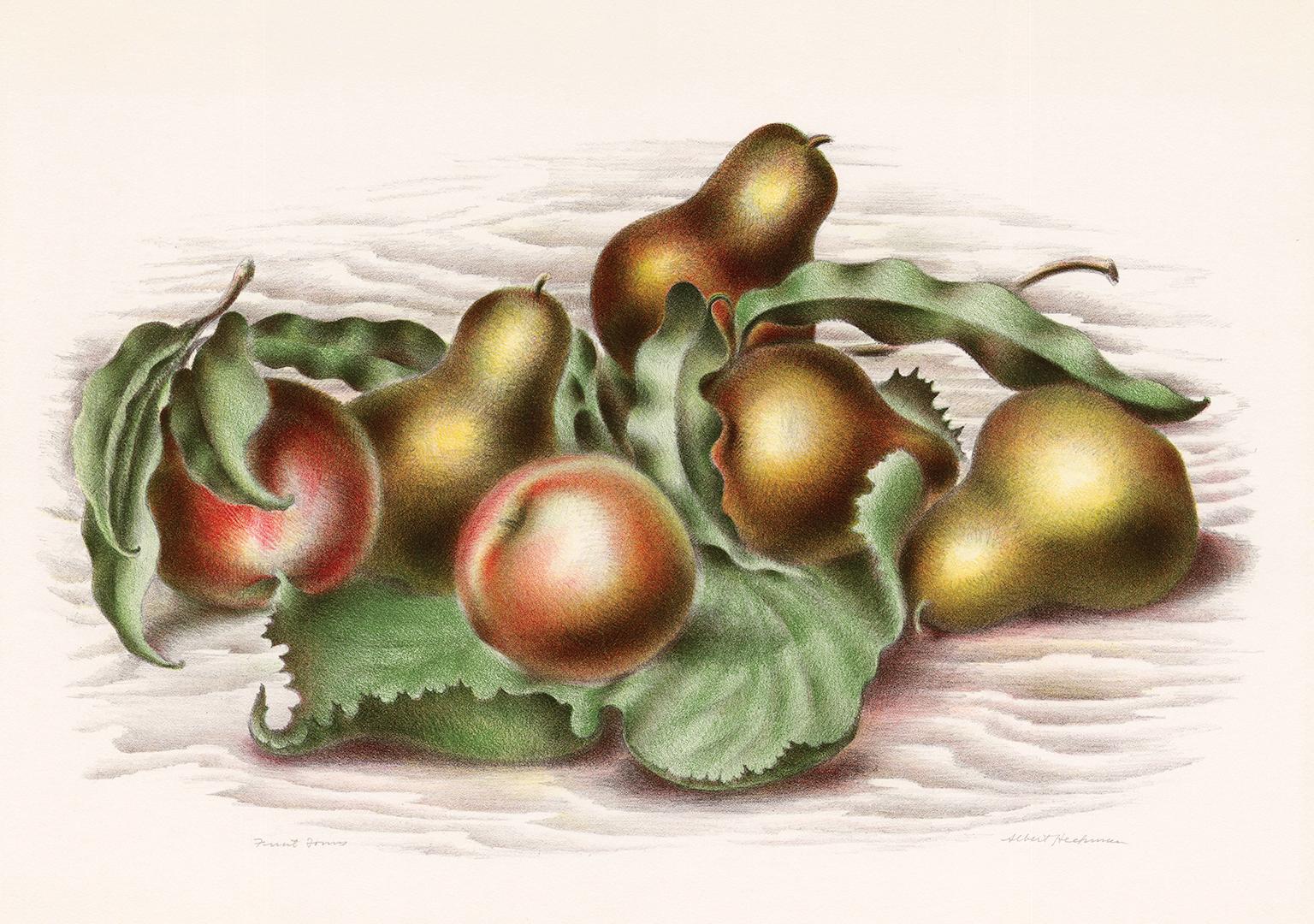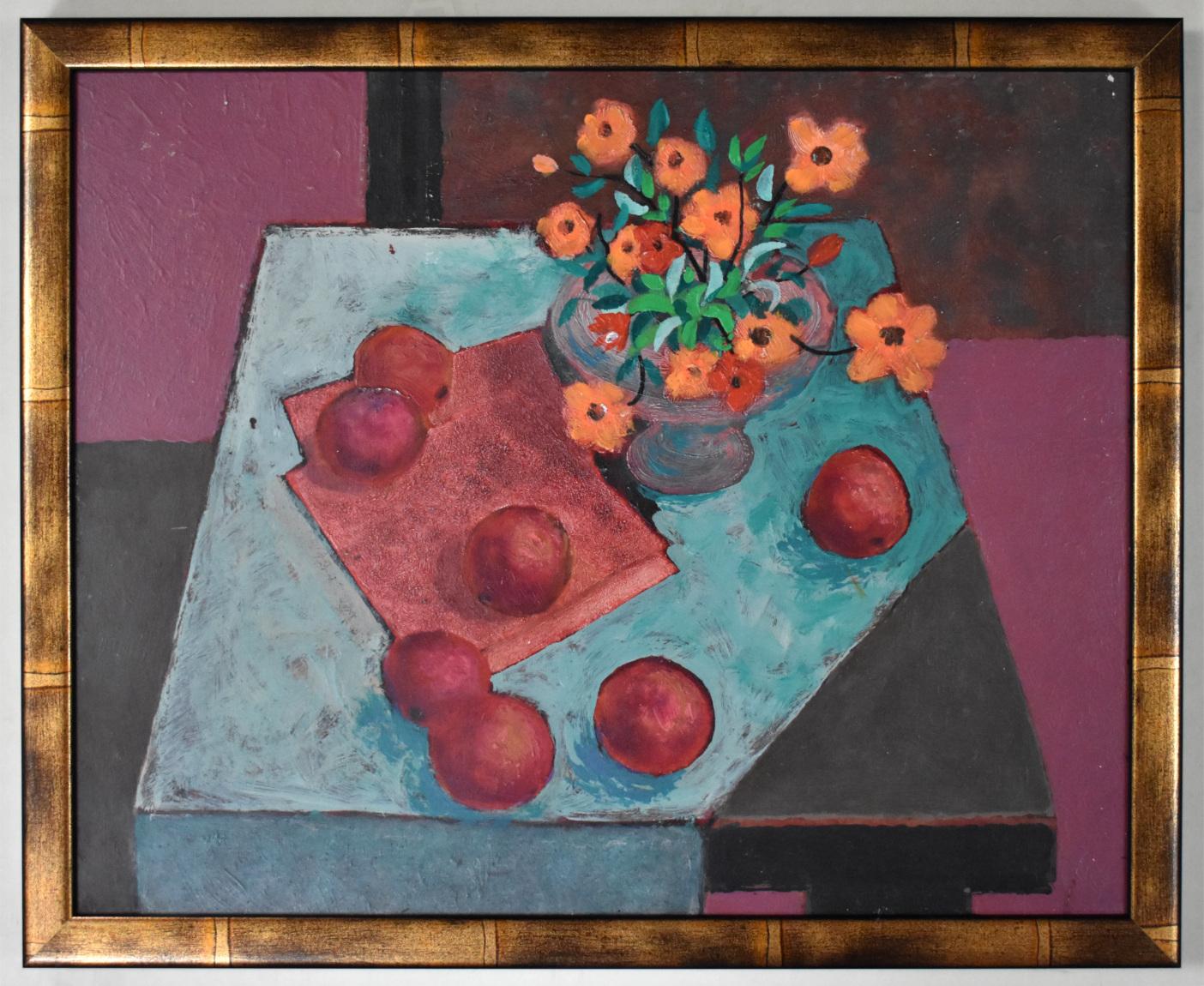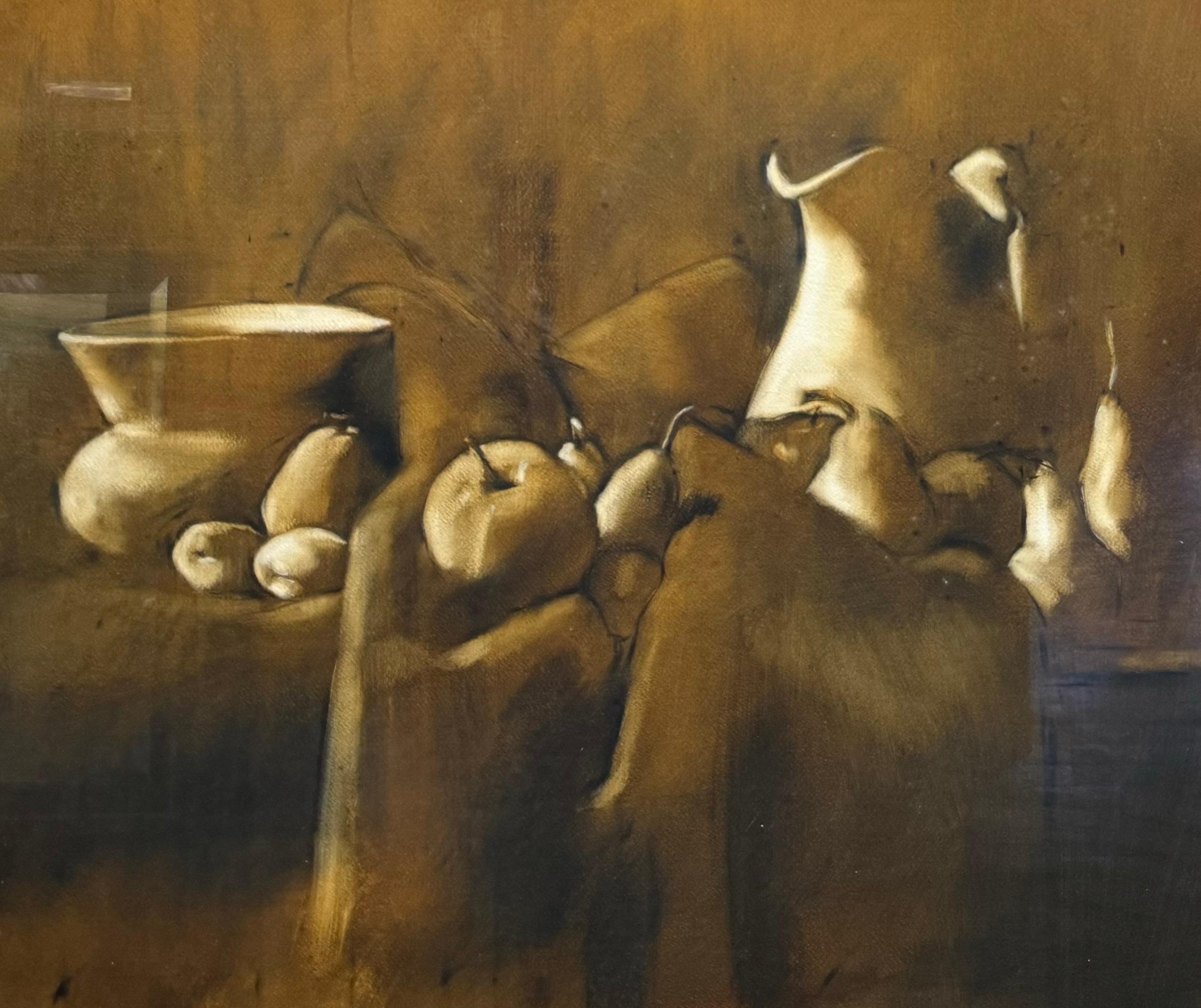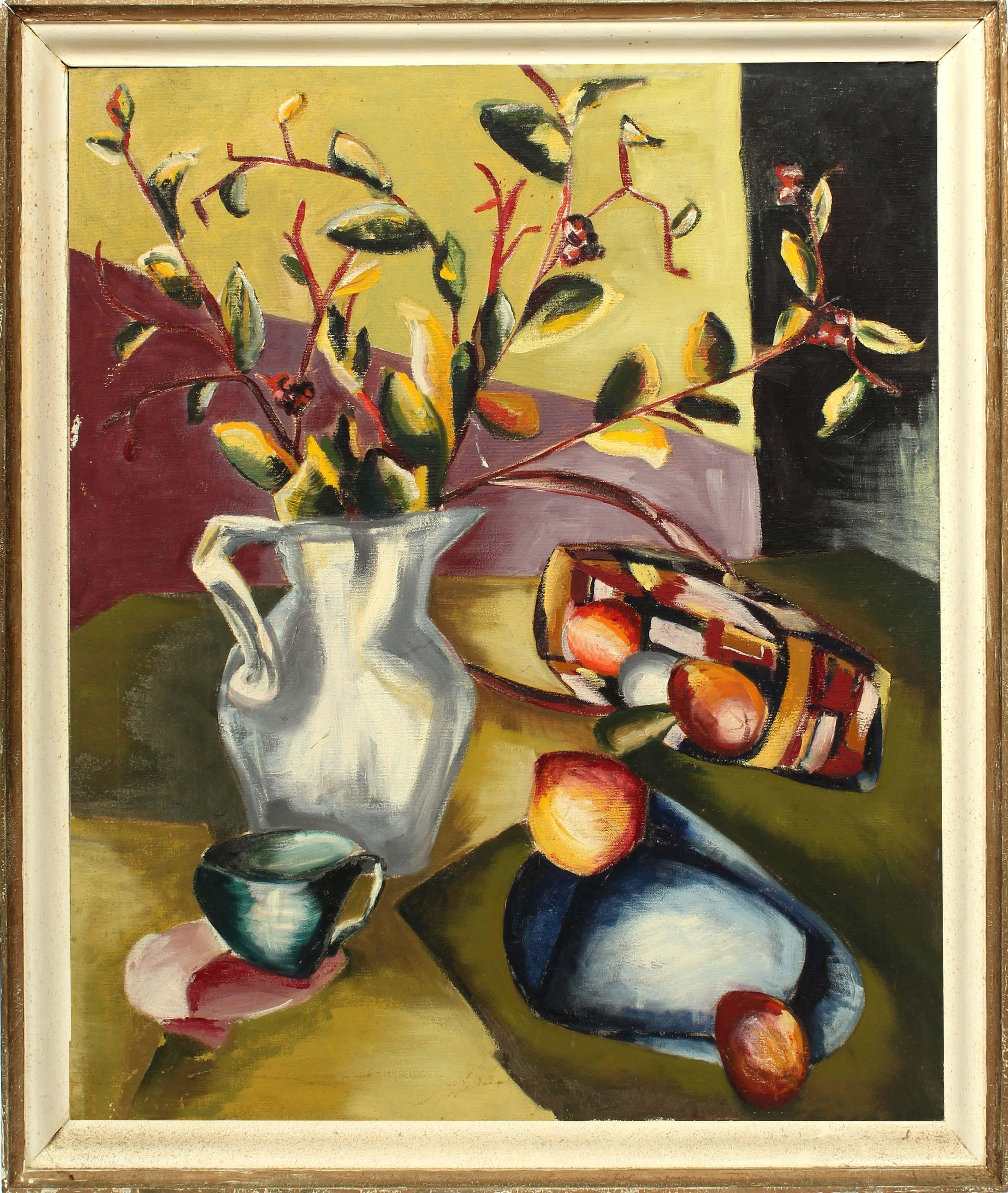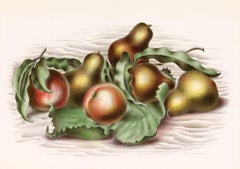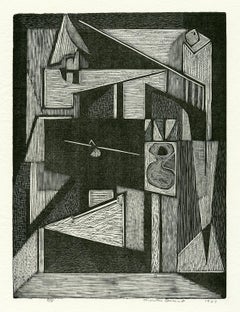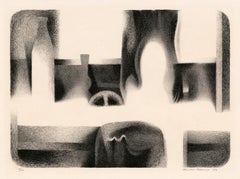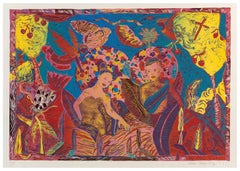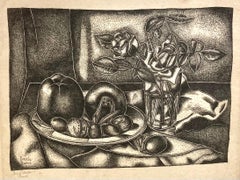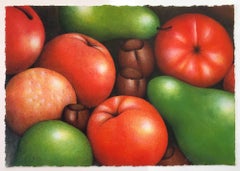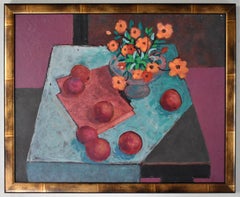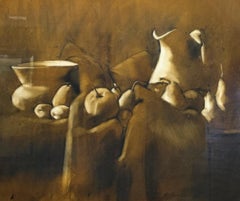Items Similar to 'Fruit Piece' — American Modernism, Woman Artist
Want more images or videos?
Request additional images or videos from the seller
1 of 3
Pamela Bianco'Fruit Piece' — American Modernism, Woman Artistc. 1925
c. 1925
$650
£490.95
€567.39
CA$911.72
A$1,014.07
CHF 530.74
MX$12,368.33
NOK 6,668.98
SEK 6,273.04
DKK 4,235.05
About the Item
Pamela Bianco, 'Fruit Piece', lithograph, c. 1925. Signed and titled in pencil. Signed in the stone, lower left. Annotated 'No. 8' in pencil, upper right.
A fine, richly-inked impression, with full margins (3/8 to 1/2 inches) on cream Japan paper, in very good condition. Matted to museum standards, unframed.
Image size 9 1/2 x 13 1/4 inches (242 x 336 mm); sheet size 10 1/2 x 14 1/2 inches (167 x 369 mm).
Illustrated in 'Fifty Prints' (an exhibition by the American Institute of Graphic Arts, 1926), John Day Company, New York, 1927.
Collections: Binghamton University Art Museum, National Gallery of Art, Philadelphia Museum of Art.
ABOUT THE ARTIST
Pamela Bianco (1906-1924) was born in London the daughter of an Italian scholar and bookseller, Francesco Bianco, and an English writer, Margery Williams Bianco (author of 'The Velveteen Rabbit'). She was educated at home, though home for the Biancos was a shifting location, as the family lived in France, Italy, and the United States when Pamela was a child.
Bianco's paintings and drawings were first exhibited as part of a children's show in Turin, Italy. Her career as an artist began at the age of twelve when her exhibition at Leicester Galleries, London, brought the child prodigy to international recognition. Following the show, Walter de la Mare composed a series of poems entitled 'Flora' to accompany a suite of her drawings. The immediate success of Bianco's first American exhibition, arranged by Mitchell Kennedy in 1922 at Anderson Galleries, prompted her to move to New York with her parents. She printed her first lithographs with master printer George Miller in 1922, and was a member of the Studio Club from 1924 - 1928.
Her early exhibitions in the U.S. included shows in Los Angeles and San Francisco in 1922; Boston and Chicago in 1923; and in New York at Kennedy Galleries in 1924, Rehn Galleries in 1928, and Firargid Galleries in 1937. Her rich, graphically bold etchings of flowers and still life subjects continued to bring her popular acclaim.
Bianco also created illustrations for William Blake's Poems and Oscar Wilde's 'Birthday of the Infanta', a historical fiction for children. Other books illustrated by Bianco include Glenway Wescott's 'Natives of Rock' (1925), and Hazeltine and Smith's 'The Easter Book of Legends and Stories' (1947). She also illustrated several books by her mother, including 'The Skin Horse', 'The Adventures of Andy', and 'The Little Wooden Doll'.
In 1930, Bianco was awarded a Guggenheim Fellowship and spent a year in Florence and Rome during which she wrote and illustrated the children's fairy tale 'The Starlit Journey'.
A retrospective exhibition of Pamela Bianco's works was mounted in 2004 in London at England & Co Gallery and an exhibition catalogue published.
Works by Pamela Bianco are in the collections of the Art Institute of Chicago, Binghamton University Art Museum, British Museum (London), Brooklyn Museum, Carnegie Museum of Art, Museum of Modern Art, National Gallery of Art, Philadelphia Museum of Art, and the Whitney Museum of American Art.
- Creator:Pamela Bianco (1906 - 1994, American)
- Creation Year:c. 1925
- Dimensions:Height: 9.5 in (24.13 cm)Width: 13.25 in (33.66 cm)
- Medium:
- Movement & Style:
- Period:
- Condition:
- Gallery Location:Myrtle Beach, SC
- Reference Number:Seller: 963231stDibs: LU532312736832
About the Seller
5.0
Recognized Seller
These prestigious sellers are industry leaders and represent the highest echelon for item quality and design.
Platinum Seller
Premium sellers with a 4.7+ rating and 24-hour response times
Established in 1995
1stDibs seller since 2016
316 sales on 1stDibs
Typical response time: 1 hour
Associations
International Fine Print Dealers Association
- ShippingRetrieving quote...Shipping from: Myrtle Beach, SC
- Return Policy
Authenticity Guarantee
In the unlikely event there’s an issue with an item’s authenticity, contact us within 1 year for a full refund. DetailsMoney-Back Guarantee
If your item is not as described, is damaged in transit, or does not arrive, contact us within 7 days for a full refund. Details24-Hour Cancellation
You have a 24-hour grace period in which to reconsider your purchase, with no questions asked.Vetted Professional Sellers
Our world-class sellers must adhere to strict standards for service and quality, maintaining the integrity of our listings.Price-Match Guarantee
If you find that a seller listed the same item for a lower price elsewhere, we’ll match it.Trusted Global Delivery
Our best-in-class carrier network provides specialized shipping options worldwide, including custom delivery.More From This Seller
View All'Fruit Forms' — American Modernism
By Albert Heckman
Located in Myrtle Beach, SC
Albert Heckman, 'Fruit Forms', color lithograph, edition not stated, c. 1935. Signed and titled in pencil. A fine, richly-inked impression, with fresh colo...
Category
1930s American Modern Still-life Prints
Materials
Lithograph
Still Life — Mid-century Modern
By Charles Quest
Located in Myrtle Beach, SC
Charles Quest, 'Still Life', 1947, wood engraving, edition 8. Signed, dated, and numbered '3/8' in pencil. Titled and annotated 'wood engraving' in the bottom left margin. A fine impression, on off-white wove paper, with full margins (1 to 2 inches), in excellent condition. Scarce. Matted to museum standards, unframed.
ABOUT THE ARTIST
Charles Quest, painter, printmaker, and fine art instructor, worked in various mediums, including mosaic, stained glass, mural painting, and sculpture. Quest grew up in St. Louis, his talent evident as a teenager when he began copying the works of masters such as Michelangelo on his bedroom walls. He studied at the Washington University School of Fine Arts, where he later taught from 1944 to 1971. He traveled to Europe after his graduation in 1929 and studied at La Grande Chaumière and Academie Colarossi, Paris, continuing to draw inspiration from the works of the Old Masters.
After returning to St. Louis, Quest received several commissions to paint murals in public buildings, schools, and churches, including one from Joseph Cardinal Ritter, to paint a replica of Velasquez's Crucifixion over the main altar of the Old Cathedral in St. Louis. Quest soon became interested in the woodcut medium, which he learned through his study of J. J. Lankes' A Woodcut Manual (1932) and Paul Landacre's articles in American Artist magazine ‘since no artists in St. Louis were working in wood’ at that time. Quest also revealed that for him, wood cutting and engraving were ‘more enjoyable than any other means of expression.’
In the late 1940s, his graphic works began attracting critical attention—several of his woodcuts won prizes and were acquired by major American and European museums. His wood engraving entitled ‘Lovers’ was included in the American Federation of Art's traveling print exhibition in 1947. Two years later, Quest's two prize-winning prints, ‘Still Life with Grindstone’ and ‘Break Forth into Singing’, were exhibited in major American museums in a traveling show organized by the Philadelphia Print Club. His work was included in the Chicago Art Institute's exhibition, ‘Woodcut Through Six Centuries’, and the print ‘Still Life with Vise’ was purchased by the Museum of Modern Art in New York.
In 1951 he was invited by artist-Curator Jacob Kainen to exhibit thirty wood engravings and color woodcuts in a one-person show at the Smithsonian's National Museum (now known as the American History Museum). Kainen's press release praised the ‘technical refinement’ of Quest's work: ‘He obtains a great variety of textural effects through the use of the graver, and these dense or transparent grays are set off against whites or blacks to achieve sparkling results. His work has the handsome qualities characteristic of the craftsman and designer.’
At the time of the Smithsonian exhibition, Quest's work was represented by three New York galleries in addition to one in his home town. He had won 38 prizes, and his prints were in the collections of the Library of Congress, the Chicago Art Institute, the Metropolitan Museum, and the Philadelphia Museum of Art. In cooperation with the Art in Embassies program, his color woodcuts were displayed at the American Embassy in Paris in 1951.
Recognition at home came in 1955 with his first solo exhibition in St. Louis. Press coverage of the show heralded the ‘growth of graphic arts toward rivaling painting and sculpture as a major independent medium’.
An exhibition of his prints at the Bethesda Art Gallery in 1983 attracted Curator Emeritus Joseph A. Haller, S.J., who began purchasing his work for Georgetown University's collection. In 1990 Georgetown University Library's Special Collections Division was the recipient of a large body of Quest's work, including prints, drawings, paintings, sculpture, stained glass, and his archive of correspondence and professional memorabilia. These extensive holdings, including some 260 of his fine prints, provide a rich opportunity for further study and appreciation of this versatile and not-to-be-forgotten mid-Western American artist...
Category
1940s American Modern Abstract Prints
Materials
Woodcut
'September Still Life' — Mid-Century Modernism
By Clinton Adams
Located in Myrtle Beach, SC
Clinton Adams, 'September Still Life', lithograph, 1956, edition 20. A superb impression, on cream wove paper, with full margins (1 1/2 to 3 1/8 inches);...
Category
1950s American Modern Still-life Prints
Materials
Lithograph
'The Garden' — Celebrated Contemporary African American Artist
By Margo Humphrey
Located in Myrtle Beach, SC
Margo Humphrey, 'The Garden (Adam and Eve)', reductive color woodcut, 1989. Signed, dated, and annotated 'A/P' in pencil. Signed and dated in the image, lower right. A fine, richly-inked, artist's proof impression, with fresh, vivid colors, on BFK Rives, heavy, off-white wove paper; the full sheet with margins (1 to 1 3/8 inches), in excellent condition. Archivally sleeved, unmatted. Scarce.
Image size 27 1/4 x 39 1/8 inches (692 x 994 mm); sheet size 29 1/2 x 42 inches (749 x 1,067 mm).
ABOUT THIS WORK
"Humphrey continued to reinterpret stories from the Bible with African American figures. In 1989 she published the woodcut print 'The Garden' at Magnolia Editions in Oakland, CA. For this rare foray into relief printmaking, she employed the reductive method, which uses only one block that is successively carved for each color segment, reducing the block with each cutting. Technically challenging, this lush and elaborate print is a testament to Humphrey’s skills as a printmaker. A youthful Adam and Eve are depicted in a luxuriant tropical landscape. Here, Humphrey chooses not to include the traditional symbols of humanity’s downfall but instead portrays them as being protected by angels in an atmosphere of idyllic bounty. ...Although Humphrey challenges traditional representation of Christian themes, her images are not iconoclastic but present a broader, more inclusive engagement with religious spirituality."
— Adrienne L. Childs, 'Margo Humphrey, The David C. Driskell Series of African American Art: Volume VII,' Pomegranate Communications, Inc., 2009, page 71.
ABOUT THE ARTIST
American printmaker, illustrator, and art teacher Margo Humphrey was born in Oakland, California, in 1942. She earned a BFA in Painting and Printmaking from the California College of Arts and Crafts and a Master of Fine Arts degree in Printmaking from Stanford University.
Humphrey began teaching in 1973 at the University of California Santa Cruz and has since taught at the University of Texas at San Antonio, the San Francisco Art Institute, and the School of the Art Institute of Chicago. She has also taught at the University of the South Pacific in Suva, Fiji; Yaba Technological Institute of Fine Art, Ekoi Island, Nigeria; the University of Benin in Benin City, Nigeria; the Margaret Trowell School of Fine Art in Kampala, Uganda, and the Fine Art School of the National Gallery of Art, Harare, Zimbabwe. In 1989, she was appointed Department Head of Printmaking at the University of Maryland in College Park.
Humphrey has worked in lithography, monoprint, and woodcut with significant printmaking ateliers, including the Rutgers Center for Innovative Print and Paper, the Bob Blackburn Printmaking Workshop, and the Tamarind Institute in New Mexico. She was one of the earliest African-American woman artists to distinguish herself as a lithographer in a highly technical, male-dominated profession and was the first to have her prints published by Tamarind in 1974.
Humphrey’s imagery combines historical perspective, autobiography, and fantasy to illuminate her experience as an African American woman. Bold, saturated color, animated figures, and syncopated rhythmic arrangements are hallmarks of Humphrey's oeuvre. Though Humphrey labels her distinctive style "sophisticated naive," the narrative complexity and technical skill of her works attest to her artistic virtuosity. Joyful, expressive, and at times humorous, her works offer engaging commentary on the presumptions of American culture and myth while embracing her personal vision of authenticity and spirituality.
She developed her 1987 work The Last Bar-B-Que, a vividly colored transformation of the Last Supper, following a three-year period during which she examined portrayals of the iconic subject by artists from Pietro Lorenzetti to Emil Nolde. Her narrative work The Garden, a monumentally scaled reductive woodcut, is a further example of an archetypal subject—Adam and Eve in the Garden of Eden—debunked and rendered with fresh, life-affirming vibrancy.
Since her first solo exhibition in 1965, Humphrey’s works have been exhibited internationally. They are held in major institutions, including the Museum of Modern Art, The Smithsonian American Art Museum, the Philadelphia Museum of Art, the Hampton University Museum, the Victoria and Albert Museum (London), the Museum of Modern Art, Rio de Janeiro, and the National Gallery of Modern Art, Lagos. In 1996, she was invited to be part of the World Printmaking Survey at the Museum of Modern Art, New York.
In 2011, Hampton University Museum mounted a 45-year retrospective of Humphrey’s work Her Story: Margo Humphrey Lithographs and Works on Paper, jointly curated by Robert E. Steele, executive director of the David Driskell...
Category
1980s Expressionist Figurative Prints
Materials
Woodcut
Modernist Nude — Atelier 17
Located in Myrtle Beach, SC
Russell T. Limbach, 'Untitled (Modernist Nude)', etching and aquatint, no known edition, c. 1930. Signed in pencil. A fine impression, on cream wove paper, with full margins (1 7/8 to 2 3/4 inches), in excellent condition. Image size 8 15/16 x 5 15/16 inches; sheet size 13 3/8 x 10 1/4 inches. Extremely rare. Matted to museum standards, unframed.
Probably created when Limbach was in Paris (1928-1934), where he was exposed to modernist printmaking explorations at Stanley William Hayter’s 'Atelier 17'.
ABOUT THE ARTIST
Born in Massillon, Ohio, Russell Limbach...
Category
1930s American Modern Nude Prints
Materials
Etching
#5 — Modernist Abstraction — African American Artist
Located in Myrtle Beach, SC
Hilliard Dean, '#5', color lithograph, 1970, edition not stated but small. Signed, titled, and annotated 'AP' in pencil. Dated 'June 11, 70' in pencil in...
Category
1970s Contemporary Abstract Prints
Materials
Lithograph
You May Also Like
Pamela Bianco, Fruit Piece
Located in New York, NY
Pamela Bianco achieve success as an artist in Britain while still a child. This accomplishment resulted in the family coming to the United States where ...
Category
1920s American Modern Still-life Prints
Materials
Lithograph
Untitled (fruit)
By Eva Bostrom
Located in Palm Springs, CA
Signed and numbered lithograph from the edition of 250. Medley of pears, tomatoes and potatoes. A whole series of different fruits and vegetables from this series are available.
Ev...
Category
21st Century and Contemporary Contemporary Still-life Prints
Materials
Lithograph
$150 Sale Price
40% Off
"STILL LIFE FRUIT" MID CENTURY
By Michael Frary
Located in San Antonio, TX
Michael Frary
(1918 - 2005)
Austin Artist
Image Size: 16 x 20
Frame Size: 17.5 x 21.5
Medium: Oil
"Still Life Fruit"
Biography
Michael Frary (1918 - ...
Category
1960s American Modern Still-life Paintings
Materials
Oil
American Female Abstract painter Modernist Still Life w/ Fruits GALLERY LABEL
By Peri Schwartz
Located in New York, NY
Peri Schwartz (born October 4, 1951, Brooklyn, New York) is an American painter and printmaker. She was born in Brooklyn, New York and raised in Far Rockaway, New York. She received her BFA from Boston University College of Fine Arts in 1973 and an MFA from Queens College in 1975.
Up for sale is a wonderful Still Life with fruits Painting...
Category
1990s Abstract Expressionist Abstract Paintings
Materials
Charcoal, Pastel, Mixed Media, Gouache
Mid-Century Modern American Oil Painting Abstract cubist still life fruit
Located in Buffalo, NY
Anita Johnson
Untitled (Still Life with Pitcher and Basket of Fruit), c. 1950s
Oil on canvas
Framed dimensions: 30 in. H × 27 in. W
Original vintage frame in silver gilt
In Still Li...
Category
Mid-20th Century Cubist Abstract Paintings
Materials
Canvas, Oil
"Still Life of Fruit " Albert Swinden, American Abstract Association, AAA
By Albert Swinden
Located in New York, NY
Albert Swinden (1901 - 1961)
Still Life of Fruit, 1937
Oil on canvas
18 x 30 inches
Provenance:
Graham Gallery, New York
Albert Swinden (1901–1961) was an English-born American abstract painter. He was one of the founders of the American Abstract Artists, and he created significant murals as part of the Federal Art Project.
Albert Swinden was born in Birmingham, England in 1901. When he was seven, he moved with his family to Canada, and in 1919 he immigrated to the United States. He lived in Chicago, where he studied for about a year and a half at the Art Institute. He then relocated to New York City, where his art education continued briefly at the National Academy of Design. He soon changed schools again, to the Art Students League, which he attended from 1930 to 1934. He studied with Hans Hofmann and gained an appreciation for Synthetic Cubism and Neoplasticism. According to painter and printmaker George McNeil, Swinden "could have influenced Hofmann ... He was working with very, very simple planes, not in this sort of Cubistic manner. Swinden was working synthetically at this time." While still a student, Swinden began teaching at the Art Students League, in 1932.
Swinden married Rebecca Palter (1912–1998), from New York. Their daughter, Alice Swinden Carter, also became an artist. Carter, who attended the School of the Museum of Fine Arts, Boston, received an award from the Institute of Contemporary Art, Boston for her large sculptures.
Swinden was hired for the Federal Art Project (FAP) of the Works Progress Administration (WPA), and he is best known for the murals which he painted as part of that project.
In 1935, New York City Mayor Fiorello La Guardia attended the opening of the inaugural exhibit at the Federal Art Project Gallery, accompanied by Audrey McMahon, New York regional director for the Works Progress Administration/Federal Art Project. Among the works on display was Abstraction, a sketch by Swinden; it was the design for a mural planned for the College of the City of New York. A newspaper account described it as consisting of "brightly colored T-squares, triangles and rulers in horizontal, vertical and diagonal positions". La Guardia asked what it was, and upon being told it was a mural design, he said he didn't know what it depicted. Someone joked that it could be a map of Manhattan. The displeased mayor stated that "if that's art, I belong to Tammany Hall." (Tammany Hall, which the Republican mayor referenced, was the New York Democratic Party political society.) Fearing that the mayor's negative attitude could jeopardize the future of abstract art within the Federal Art Project, McMahon dispatched an assistant to summon an artist who could speak to the mayor in defense of abstraction. The assistant returned with Arshile Gorky.
Swinden played an important role in the founding of the American Abstract Artists. In 1935, he met with three friends, Rosalind Bengelsdorf, her future husband Byron Browne, and Ibram Lassaw, with the goal of exhibiting together. The group grew and started meeting in Swinden's studio, which adjoined those of Balcomb and Gertrude Greene...
Category
1930s Modern Still-life Paintings
Materials
Canvas, Oil
$4,800 Sale Price
20% Off
More Ways To Browse
Antique Piece
Stone Fruit
Antique Native American Prints
Antique Fruit Prints
Antique Wooden Fruit
3 Piece Suite
Antique Easter
Antique Stone Fruit
Japanese Rabbit
Antique Rabbit Paintings
Antique French Doll
Antique French Dolls
Antique Rocking Horse
Antique Black Dolls
Antique Paper Dolls
Children Rocking Horse
Rabbit 1930
Antique Rabbit Print
